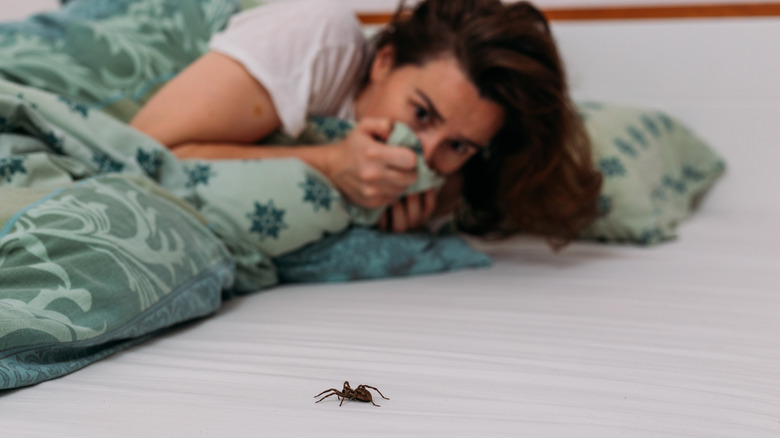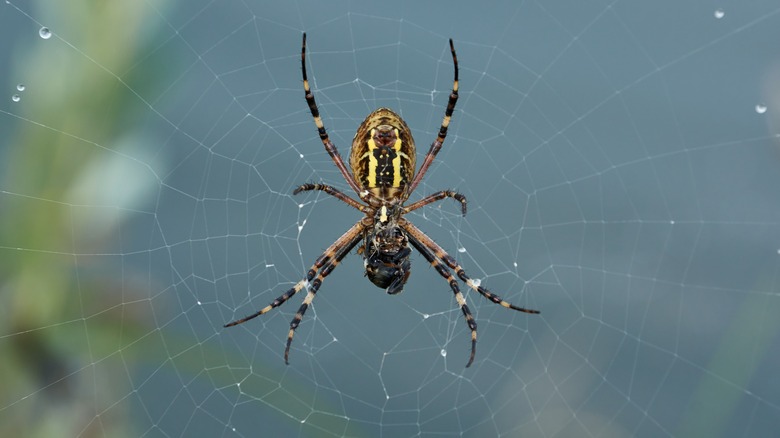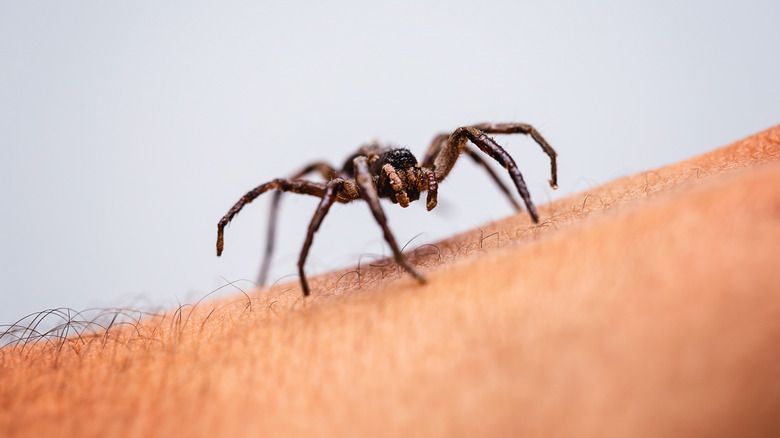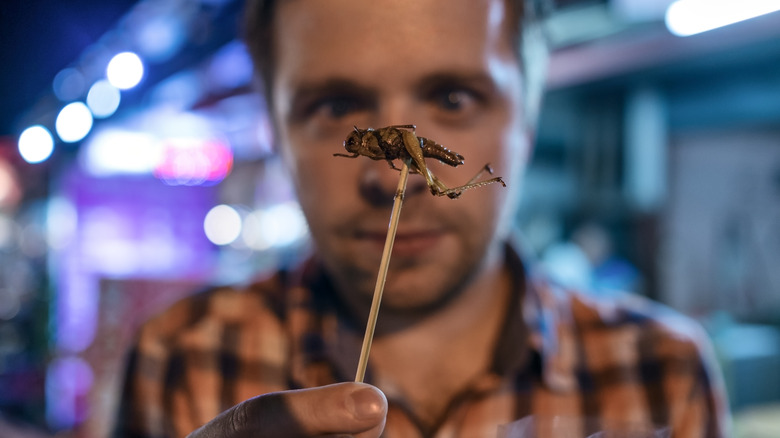Do We Actually Swallow Spiders In Our Sleep?
We've all been there, neatly tucked under the covers with the fan on and one leg dangling from the side of the bed, eyelids closed, mouth open, drifting into a deep sleep when — bam! — a spider crawls right into our gaping mouth like it's the doorway to another dimension. The spider's tiny legs spindle round and round over the tops of our tongues, but we do not awaken. We do not panic, or shoo it, or reach for the aerosol insect spray. Instead, we do what any normal unsuspecting sleeping person would — we swallow the spider. Or at least that's how the legend goes.
According to Britannica, there's a widely held belief that everyone across the planet swallows spiders in their sleep. As the story goes, we don't just swallow one or two spiders in a lifetime either. According to the tale, we swallow approximately eight spiders each year. Since the average person in the United States lives to be almost 80 (via WorldData), that's a jaw-dropping 640 swallowed spiders in a lifetime. This is quite the arachnid diet, but is it true? Do we really swallow eight spiders in our sleep each year?
The answer is ... no
Britannica reports that this is almost entirely legend. People who hold this belief to be factual should wake up to the harsh reality that we do not swallow 640 spiders in our sleep throughout our lives. We do not close our eyes and drift into slumber only to have potentially poisonous insects take a tour of our mouths and a dive down our throat and into our digestive system. The true number of spiders most people swallow in their sleep is actually, unsurprisingly, zero.
Why is that? When you think about it, an alarming number of human beings sleep with their mouths open. Fun fact for all you "Stranger Things" fans — people who sleep with their mouths open are scientifically referred to as mouth-breathers (via Science Focus). According to PR Newswire, one study consisting of about 1,001 participants found that approximately 61% were of the mouth-breathing variety. This means that the majority of human beings are lying in bed with the trap door wide open and ripe for invasion. So, why aren't spiders, or other insects for that matter, crawling in there and snooping around?
Why don't spiders crawl in our mouths while we're sleeping?
The short answer is they're afraid. According to NPR, the latest data suggests that spiders possess the innate ability to feel fear and sense danger and perceive spiders and other predator species as a threat. Their instinct in a threatening situation is to run in the other direction as opposed to running right into the mouth of the slumbering giant. In this case, that giant is you.
Entomologist Matan Shelomi points out that insects are much more intelligent than we give them credit for. In a brief explanation initially posted on Quora and later published to Forbes, he said, "They will not crawl into the warm, moist, CO2-exhaling cave that is pretty obviously the entrance to something big and living." Multiple studies on spider thought patterns have concluded that they are pretty complex thinkers with clear-cut decision-making abilities who are not always acting on instinct alone (via NPR). To them, the human being is a formidable opponent, sleeping or not. This is not to mention that the sleeping human makes sounds, and the sly spider has excellent hearing. From its web, the spider can hear your snores vibrating against your lips and your heart beating softly in your chest (via Treehugger). It feels the vibration of those sounds and knows to stay away.
The origin of this myth is rooted in even more legend
There is a myriad of reasons you're probably not swallowing spiders in your sleep. So, how did this misleading story manage to take hold of society, and why do so many people believe it to this day? According to Britannica, the myth finds its roots in a 1993 magazine article that spoke on the possible dangers of misinformation spreading like wildfire on the internet. The so-called "fact" that we swallow a precise number of spiders each year was completely fabricated and meant to serve as an example of the kind of ludicrous gossip that could become widespread if the internet went unchecked.
Ironically, despite Britannica's claim, fact-checking website Snopes states that the origin of this myth is a myth too. According to them, there was no such article printed in "PC Professional," making the article and the author of the article an elaborate hoax, and one that proves misinformation about misinformation will also spread like wildfire on the internet.
This widely-held myth reflects our fears
Whether the rumor originated between the pages of a magazine or someplace else entirely, one thing is certain: it spread because we're deathly afraid of spiders. Psychology Today reports that this deep-seated fear might even be passed down to us from our ancestors through our genes or, even more realistically, through the conversations we had with our parents regarding spiders. This would make arachnophobia a cultural fear, which makes sense given that it perpetuates urban legends. Mass media plays right into this fear, depicting imagery of insects crawling through the mouths of dead bodies time and again.
According to The Guardian, most people who hear this myth immediately believe it to be true, and their reactions are pretty wild. One reader stated, "The actual figure is probably much higher." He went on to say that we only swallow harmless, small spiders, the kind that "seem to float," so that's probably okay. Another troubled reader claimed to have changed their nighttime attire in light of the information, stating, "I now sleep in a onesie that zips over my head so that my whole body is protected."
Well, if you're one of the many people who fell for this urban legend, rest at ease. You are not swallowing spiders while you're sleeping — you're doing it while you're awake (via Insider).
We eat approximately 140,000 bug fragments per year
It turns out the that the clever Spidey's senses never lied. The critter was correct to fear an open human mouth. According to Insider, the average human being consumes about 140,000 bug fragments per year. We just don't do it while we're sleeping — we wait until we're fully awake to snack on these ground-up morsels. So, while you might not be eating spiders during a summer nap, there are certainly insect parts in your chocolate-coated candy bar. This is food for thought for vegetarians and arachnophobes alike.
Insider reports that as the climate crisis threatens more environments, bugs could become the super-food of the future, and the good news is they're already FDA approved. In California's Silicon Valley, bug-eating start-up companies are all the rage. In fact, according to The Guardian, the edible insect market (which is a real thing) is projected to grow by a whopping $6.3 billion in the next seven or so years. Bon appétit!





